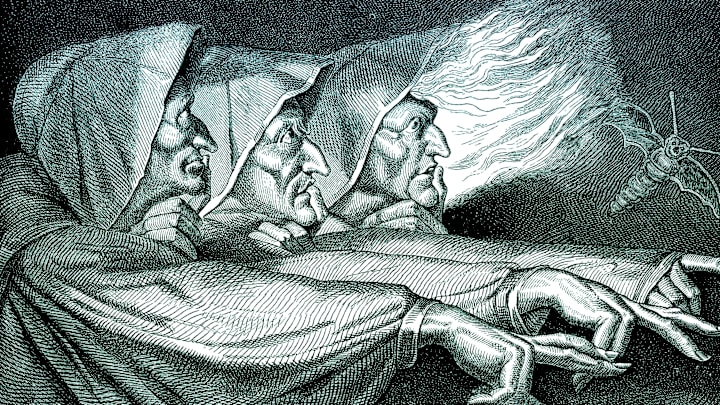In what could easily be described as a weird turn of events, weird is turning out to be one of the political words of the year thus far, thanks to the fact that the Democratic candidates for President and Vice President are using it frequently to describe their Republican opponents. But where did this strange word come from, and how has it changed over the centuries?
The Witchy Original Meaning of Weird
Weird has been recorded since the days of Old English (when it was spelled wyrd), and unlike how we use it today, it wasn’t an adjective, but a noun. According to the Oxford English Dictionary (OED), it meant, “The principle, power, or agency by which events are predetermined; fate, destiny.” Over the subsequent centuries, weird also came to refer to a witch, a wizard, an omen, or a prophecy. In other words, a weird could tell you a weird.

That sense naturally led to use as an adjective. The OED defines the original sense of adjectival weird as “Having the power to control the fate or destiny of human beings, etc.; later, claiming the supernatural power of dealing with fate or destiny.” Early uses of adjectival weird in the 1400s all refer to weird sisters, i.e. the Fates, and Shakespeare co-opted the phrase for his prophetic witches in MacBeth (“The weyward Sisters, hand in hand ... Thus doe goe, about, about”). From there, according to Merriam-Webster, “Subsequent adjectival use of weird grew out of a reinterpretation of the weird used by Shakespeare.”
The Many Forms of Weird
By the 19th century, weird was a little less about fate or destiny and more of a shorthand for magic or the supernatural. The OED defines this second sense of the term as “Partaking of or suggestive of the supernatural; of a mysterious or unearthly character; unaccountably or uncomfortably strange; uncanny.” An 1822 letter by poet Percy Bysshe Shelley self-applies the term: “And here, like some weïrd Archimage sit I, Plotting dark spells.”
In 1864, Charles Dickens used the word in Our Mutual Friend in a way that showed weird’s evolution in meaning wasn’t done: “The person of the house gave a weird little laugh here.” That “weird little laugh” is a long way from the supernatural snickers of the weird sisters, and in fact, it wasn’t long before almost anything could be called “weird,” from appearances to sounds to something as mundane as a typo. “The ‘Guacciadim’ of p. 140 is a weird misprint for Guicciardini,” opined the English Historical Review in 1912. Like many words (including fantastic, horrible, and terrific), weird has undergone a process known as amelioration—a softening and broadening in meaning. A weird sister today would be considerably less supernatural than a weird sister of centuries past.
Even as it became an adjective describing spooky witchery and general oddness, weird was also used as a verb. This sense, meaning “to preordain by the decree of fate,” often turned up in the passive voice. Take this 1678 use from the Collection of English Proverbs: “A man may wooe where he will, but he will wed where he is weard.” It could also mean “to assign to (a person) his or her fate,” as in this use from Walter Scott’s 1802 book Minstelstry of the Scottish Border: “I weird ye to a fiery beast, And relieved sall ye never be …”
In more recent times, you might also use the phrase weirded out, a slang term that dates back to the 1970s meaning “to induce a sense of discomfort.” A New York Times Magazine article from 2002 contains this usage: “I’ve been raising goats for years, I love them, so at first the idea of making them secrete spider silk kind of weirded me out.”
Like beauty, weirdness is in the eye of the beholder. But there’s nothing odd about weird’s lexical journey. Words always evolve in a living language, and you don’t need a weird sister to predict that.
Learn More About Words:
